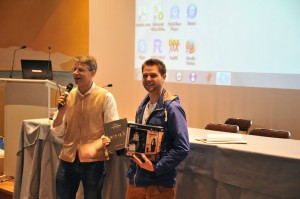There will be two poster presentations at SFN in Washington, DC., on the topic of auditory predictions in speech perception. The first poster, authored by Alexandra Bendixen, Mathias Scharinger, and Jonas Obleser, summarizes as follows:
Speech signals are often compromised by disruptions originating from external (e.g., masking noise) or internal (e.g., sluggish articulation) sources. Speech comprehension thus entails detecting and replacing missing information based on predictive and restorative mechanisms. The nature of the underlying neural mechanisms is not yet well understood. In the present study, we investigated the detection of missing information by occasionally omitting the final consonants of the German words “Lachs” (salmon) or “Latz” (bib), resulting in the syllable “La” (no semantic meaning). In three different conditions, stimulus presentation was set up so that subjects expected only the word “Lachs” (condition 1), only the word “Latz” (condition 2), or the words “Lachs” or “Latz” with equal probability (condition 3). Thus essentially, the final segment was predictable in conditions 1 and 2, but unpredictable in condition 3. Stimuli were presented outside the focus of attention while subjects were watching a silent video. Brain responses were measured with multi-channel electroencephalogram (EEG) recordings. In all conditions, an omission response was elicited from 125 to 165 ms after the expected onset of the final segment. The omission response shared characteristics of the omission mismatch negativity (MMN) with generators in auditory cortical areas. Critically, the omission response was enhanced in amplitude in the two predictable conditions (1, 2) compared to the unpredictable condition (3). Violating a strong prediction thus elicited a more pronounced omission response. Consistent with a predictive coding account, the processing of missing linguistic information appears to be modulated by predictive context.
The second poster looks at similar material, but contrasts coronal [t] with dorsal [k], yielding interesting asymmetries in MMN responses:
Research in auditory neuroscience has lead to a better understanding of the neural bases of speech perception, but the representational nature of speech sounds within words is still a matter of debate. Electrophysiological research on single speech sounds provided evidence for abstract representational units that comprise information about both acoustic structure and articulator configuration (Phillips et al., 2000), thereby referring to phonological categories. Here, we test the processing of word-final consonants differing in their place of articulation (coronal [ts] vs. dorsal [ks]) and acoustic structure, as seen in the time-varying formant (resonance) frequencies. The respective consonants distinguish between the German nouns Latz (bib) and Lachs (salmon), recorded from a female native speaker. Initial consonant-vowel sequences were averaged across the two nouns in order to avoid coarticulatory cues before the release of the consonants. Latz and Lachs served as standard and deviant in a passive oddball paradigm, while the EEG from 20 participants was recorded. The change from standard [ts] to deviant [ks] and vice versa was accompanied by a discernible Mismatch Negativity (MMN) response (Näätänen et al., 2007). This response showed an intriguing asymmetry, as seen in a main effect condition (deviant Latz vs. deviant Lachs, F(1,1920) = 291.84, p < 0.001) of an omnibus mixed-effect model. Crucially, the MMN for the deviant Latz was on average more negative than the MMN for the deviant Lachs from 135 to 185 ms post deviance onset (p < 0.001). We interpret these findings as reflecting a difference in phonological specificity: Following Eulitz and Lahiri, 2004, we assume coronal segments ([ts]) to have less specific (‘featurally underspecified’) representations than dorsal segments ([ks]). While in standard position, Lachs activated a memory trace with a more specific final consonant for which the deviant provided a stronger mismatch than vice versa, i.e. when Latz activated a memory trace with a less specific final consonant. Our results support a model of speech perception where sensory information is processed in terms of discrete units independent of higher lexical properties, as the asymmetry cannot be explained by differences in lexical surface frequencies between Latz and Lachs (both log-frequencies of 0.69). We can also rule out a frequency effect on the segmental level. Thus, it appears that speech perception involves a level of processing where individual segmental representations within words are evaluated.

